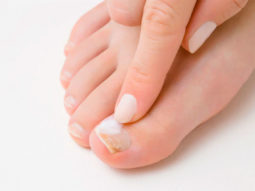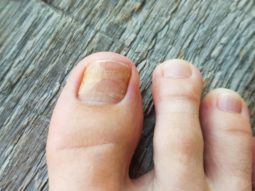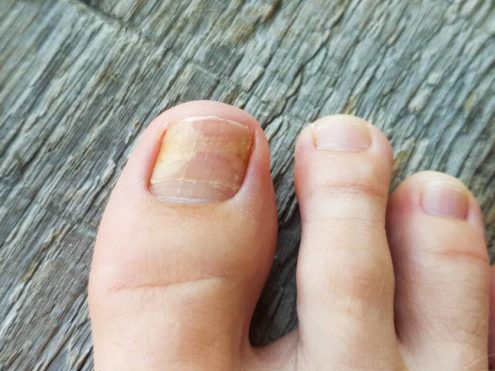Nail Fungus Home Treatment
Nail fungus, a common condition affecting the nails, can be both unsightly and uncomfortable. This article aims to provide an overview of nail fungus home treatment options.
By examining the causes and symptoms of nail fungus, as well as exploring natural remedies and lifestyle changes that may help prevent its occurrence, readers will gain a comprehensive understanding of how to manage this condition at home.
Furthermore, guidance on when it is necessary to seek professional treatment will be discussed.
Causes of Nail Fungus
The causes of nail fungus include various factors such as exposure to damp environments, compromised immune systems, and poor foot hygiene.
Nail fungus, also known as onychomycosis, is a common infection that affects the nails. It is caused by fungi that thrive in warm and moist environments.
People who frequently expose their feet to damp conditions are at higher risk for developing nail fungus. This includes individuals who wear tight shoes or socks for extended periods, athletes who sweat excessively during physical activities, and those who frequent public swimming pools or communal showers.
In addition to environmental factors, individuals with compromised immune systems are more susceptible to nail fungus. Conditions such as diabetes, HIV/AIDS, cancer treatments, and certain medications can weaken the body's immune response against fungal infections.
Poor foot hygiene also plays a role in the development of nail fungus. Failing to keep the feet clean and dry can create an ideal environment for fungi to grow and multiply.
If left untreated, nail fungus can lead to complications such as pain, discomfort while walking or wearing shoes, and even permanent damage to the nails. In severe cases, the infection may spread beyond the nails and affect other areas of the body.
Therefore, it is important for individuals at risk or experiencing symptoms of nail fungus to seek timely treatment in order to prevent further complications.
Symptoms of Nail Fungus
One of the noticeable signs associated with a fungal infection affecting the nails is the discoloration of affected areas. The color change can range from yellow or white to brown or black, depending on the severity of the infection. Other symptoms commonly observed in individuals with nail fungus include thickening of the nails, brittleness, crumbling, and a distorted shape. These symptoms may cause discomfort and pain, especially when wearing shoes or walking.
Nail fungus complications:
- Secondary bacterial infections: Due to the weakened state of the nail caused by fungal infection, bacteria can easily enter and cause further inflammation.
- Permanent damage to nails: If left untreated, nail fungus can lead to permanent damage to the affected nails. This may result in a loss of function and aesthetic appearance.
Nail fungus in children:
- Nail fungus can also affect children. However, it is less common compared to adults.
- Children who frequently engage in activities that involve water exposure (e.g., swimming) are at higher risk.
- It is important for parents to monitor their child's foot hygiene and promptly seek medical attention if any signs of nail fungus are observed.
Natural Remedies for Nail Fungus
An alternative approach to addressing nail fungus involves utilizing natural remedies. Many individuals opt for home remedies as a first-line treatment due to their accessibility and perceived safety. One such remedy that has gained popularity is the use of essential oils. Essential oils are concentrated plant extracts that possess various antimicrobial properties, making them potential candidates for treating nail fungus.
Tea tree oil, derived from the leaves of the Melaleuca alternifolia tree, is one essential oil commonly used in natural nail fungus treatments. It contains terpinen-4-ol, a compound known for its antifungal activity. Research suggests that tea tree oil may inhibit the growth of fungal organisms responsible for nail infections.
Another essential oil with antifungal properties is oregano oil. Oregano contains thymol and carvacrol compounds that have demonstrated antifungal effects against several species of fungi. However, it is important to note that research on the effectiveness of these oils in treating nail fungus is limited and inconclusive.
While using essential oils as home remedies for nail fungus may be appealing due to their natural origins, caution should be exercised as they can cause skin irritation or allergic reactions in some individuals. Therefore, it is advisable to consult a healthcare professional before using any natural remedy for treating nail fungus.
Lifestyle Changes to Prevent Nail Fungus
Implementing certain modifications in daily habits and practices can help reduce the risk of nail fungal infections. To prevent nail fungus, individuals should consider making dietary adjustments and maintaining proper foot hygiene.
Dietary Adjustments:
- Increase intake of foods rich in probiotics, such as yogurt and kefir, to promote a healthy balance of gut bacteria.
- Incorporate foods that are known to have antifungal properties into the diet, including garlic, onions, coconut oil, and apple cider vinegar.
Proper Foot Hygiene:
- Keep feet clean and dry by washing them regularly with soap and water.
- Dry feet thoroughly after bathing or swimming, paying special attention to the areas between the toes.
- Wear breathable shoes made of natural materials to allow air circulation around the feet.
- Avoid sharing personal items like towels or socks with others to prevent spreading fungal infections.
- Regularly trim nails straight across to prevent ingrown toenails which can create an environment for fungi to thrive.
When to Seek Professional Treatment for Nail Fungus
One indicator that professional intervention may be necessary for individuals with nail fungal infections is the persistence or worsening of symptoms despite implementing preventive measures and home remedies. Nail fungus, also known as onychomycosis, can present with various signs indicating severe infection. These signs include thickened nails, brittle or crumbly nails, distorted shape, foul odor, and a yellowish or brownish discoloration. In some cases, the infection may spread to other nails or even the surrounding skin.
If left untreated, nail fungus can lead to potential complications. The infection can cause pain and discomfort when walking or wearing shoes due to the thickening of the nail. It can also result in social embarrassment and decreased quality of life due to the unsightly appearance of affected nails. Moreover, individuals with diabetes or compromised immune systems are at a higher risk of developing serious complications from untreated nail fungus. In such cases, prompt professional intervention becomes essential to prevent further health complications.
Professional treatment options for nail fungus include oral antifungal medications and topical antifungal creams or solutions. Additionally, certain procedures such as laser therapy or surgical removal of infected nails may be recommended in severe cases. Seeking professional treatment is crucial when home remedies fail to alleviate symptoms or if there are indications of severe infection and potential complications arising from untreated nail fungus.
Conclusion
Nail fungus, also known as onychomycosis, is a common condition that affects many individuals. It can be caused by various factors such as exposure to damp environments or wearing tight shoes.
Symptoms of nail fungus include thickened nails, discoloration, and brittleness.
While there are natural remedies available for treating nail fungus, such as tea tree oil and vinegar soaks, it is important to make necessary lifestyle changes to prevent its recurrence.
If the infection persists or worsens despite home treatments, seeking professional treatment is advisable.
In conclusion, nail fungus can be effectively managed with proper care and attention.
Previous Posts






